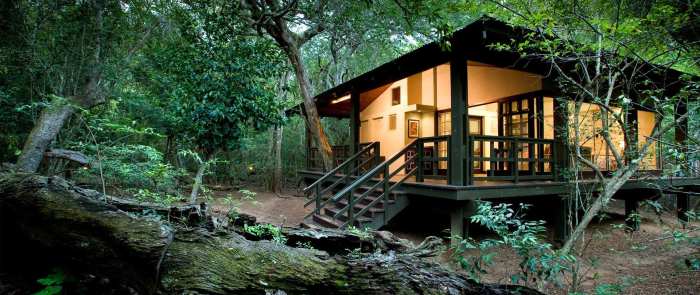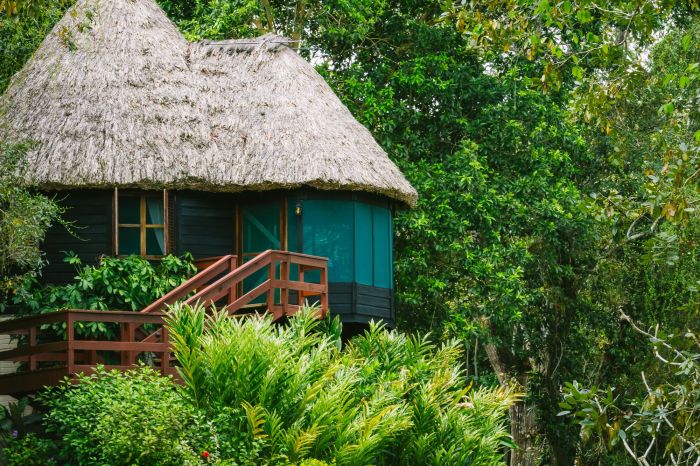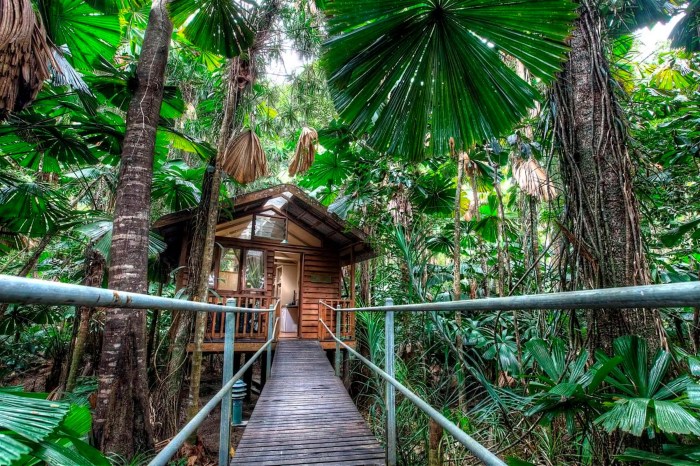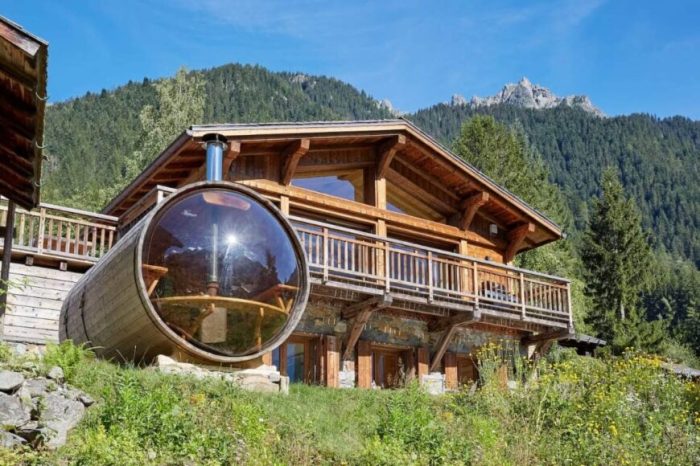Embark on an extraordinary journey into the realm of eco-lodges, where nature’s embrace intertwines seamlessly with responsible tourism. These havens of sustainability offer a transformative experience, immersing travelers in the pristine beauty of natural surroundings while fostering a deep connection to the environment.
From the lush rainforests of Costa Rica to the rugged mountains of Nepal, eco-lodges are beacons of environmental stewardship, implementing innovative practices that minimize their ecological footprint. They champion waste reduction, water conservation, and energy efficiency, ensuring that future generations can continue to marvel at the wonders of our planet.
Definition and Concept

Eco-lodges are a type of accommodation that emphasizes sustainable practices and a close connection to nature. They are designed to minimize their environmental impact while providing guests with a unique and immersive experience.
Eco-lodges are often located in remote or pristine areas, and they typically use renewable energy sources, such as solar or wind power. They also employ water conservation measures and use sustainable building materials. In addition, eco-lodges often support local communities and promote cultural preservation.
Eco-lodges are a great way to experience the natural beauty of a region while also supporting local communities. If you’re looking for a truly immersive cultural experience, consider visiting one of the best cultural festivals worldwide. These festivals offer a unique opportunity to learn about different cultures and traditions, and they’re often held in stunning natural settings.
Many eco-lodges are located near these festivals, so you can easily combine your cultural immersion with a relaxing stay in nature.
Significance in Sustainable Tourism
Eco-lodges play an important role in sustainable tourism by promoting responsible travel practices and educating guests about environmental conservation. They also help to protect biodiversity and support local economies.
Examples of Eco-Lodges Around the World
- Lapa Rios Ecolodge in Costa Rica
- Sabi Sabi Earth Lodge in South Africa
- Longitude 131° in Australia
- Six Senses Yao Noi in Thailand
- Inkaterra Reserva Amazónica in Peru
Environmental Practices
Eco-lodges implement various environmental practices to minimize their ecological impact. These include waste management, water conservation, and energy efficiency measures.
Waste management practices involve reducing, reusing, and recycling waste to divert it from landfills. Eco-lodges often compost organic waste and use biodegradable packaging to minimize their environmental footprint. They also educate guests on proper waste disposal and encourage them to reduce their consumption.
Water Conservation, Eco-lodges
Water conservation is crucial for eco-lodges, especially in arid regions. They implement measures such as low-flow appliances, rainwater harvesting systems, and water-efficient landscaping to reduce water consumption. Eco-lodges also educate guests on the importance of water conservation and encourage them to practice responsible water use.
Energy Efficiency
Energy efficiency measures help eco-lodges reduce their carbon emissions and conserve energy. They use energy-efficient appliances, lighting systems, and insulation to minimize energy consumption. Some eco-lodges also generate renewable energy through solar panels or wind turbines to reduce their reliance on fossil fuels.
Eco-lodges offer a unique and sustainable way to experience nature. If you’re looking for ways to travel more eco-friendly, be sure to check out our eco-friendly travel tips. You’ll find advice on everything from choosing the right accommodations to packing light.
Eco-lodges are a great option for those who want to minimize their environmental impact while still enjoying the beauty of the natural world.
The environmental practices implemented by eco-lodges significantly reduce their ecological footprint. These measures contribute to the preservation of natural resources, mitigate climate change, and protect the local environment for future generations.
Eco-lodges are an excellent option for budget-friendly family vacations, offering a unique and immersive experience in nature. With a focus on sustainability and conservation, these accommodations blend comfort with eco-consciousness, making them a perfect choice for families seeking an educational and environmentally responsible getaway.
To explore more budget-friendly family vacation options, visit our comprehensive guide here. Eco-lodges provide a memorable and enriching experience, fostering a love for nature and creating lasting family memories.
Social Responsibility

Eco-lodges often prioritize social responsibility initiatives that contribute to the well-being of local communities and the preservation of cultural heritage. These initiatives may include:
- Community involvement programs that create employment opportunities, support local businesses, and promote cultural exchange.
- Cultural preservation efforts that safeguard traditional practices, promote local artisans, and educate guests about the region’s history and heritage.
- Fair labor practices that ensure employees are treated ethically, provided with decent wages, and given opportunities for professional development.
These initiatives have several benefits for local communities:
- Economic empowerment through job creation and support for local businesses.
- Preservation of cultural identity and heritage, fostering a sense of pride and belonging.
- Improved education and healthcare access through community development programs.
For the tourism industry, social responsibility initiatives:
- Enhance the guest experience by providing authentic cultural interactions and a deeper understanding of the destination.
- Promote sustainable tourism practices that minimize negative impacts on local communities.
- Build positive relationships between tourism businesses and local stakeholders, fostering long-term cooperation.
Design and Architecture

Eco-lodges prioritize seamless integration with the natural environment, reflecting in their architectural design and construction. These structures often mimic the surrounding landscape, using local materials and blending with the existing topography. The goal is to minimize visual impact and maintain the integrity of the ecosystem.
Sustainable Building Materials
Eco-lodges embrace sustainable building materials, such as reclaimed wood, bamboo, and recycled materials, to reduce their environmental footprint. These materials have a lower carbon footprint and promote responsible resource management. The use of natural materials like stone and earth also helps regulate indoor temperatures and humidity, enhancing guest comfort while minimizing energy consumption.
Energy-Efficient Technologies
Eco-lodges incorporate energy-efficient technologies to minimize their reliance on fossil fuels. Solar panels, wind turbines, and geothermal heating systems are commonly employed to generate renewable energy. LED lighting, efficient appliances, and low-flow plumbing fixtures further reduce energy consumption. These measures not only reduce operating costs but also contribute to the lodge’s sustainability goals.
Guest Experience

Eco-lodges provide an immersive and transformative guest experience that fosters a deep connection with nature. Guests can escape the hustle and bustle of daily life and immerse themselves in pristine natural surroundings, surrounded by breathtaking landscapes and abundant wildlife.
Educational programs and guided tours are often offered, allowing guests to learn about the local ecosystem, conservation efforts, and sustainable practices. These programs enhance the guest experience by providing valuable insights and fostering an appreciation for the environment.
Cultural Exchange
Eco-lodges also promote cultural exchange and provide opportunities for guests to interact with local communities. Guests can learn about traditional customs, participate in cultural activities, and gain a deeper understanding of the region’s history and heritage. This exchange enriches the guest experience and fosters a sense of respect and appreciation for diverse cultures.
Responsible Travel
Eco-lodges promote responsible travel by educating guests about the importance of sustainable practices and minimizing their environmental impact. Guests are encouraged to reduce their carbon footprint, conserve water and energy, and support local businesses. By embracing responsible travel, eco-lodges empower guests to make a positive contribution to the environment and local communities.
Economic Impact: Eco-lodges

Eco-lodges have a significant economic impact on local communities and the tourism industry. They create jobs, contribute to infrastructure development, and promote economic growth.
Eco-lodges employ local people in a variety of roles, including management, hospitality, guiding, and maintenance. This provides much-needed employment opportunities in rural areas, where jobs can be scarce. In addition, eco-lodges often purchase goods and services from local businesses, which helps to support the local economy.
Infrastructure Development
Eco-lodges can also contribute to infrastructure development in local communities. For example, they may build roads, bridges, and schools, which benefit the entire community. In addition, eco-lodges often provide training and education opportunities for local people, which can help to improve their skills and knowledge.
Economic Growth
Eco-lodges can also promote economic growth by attracting tourists to an area. Tourists spend money on accommodation, food, activities, and souvenirs, which benefits local businesses and the economy as a whole. In addition, eco-lodges can help to raise the profile of an area and attract investment.
Certification and Standards
In the eco-lodge industry, certification and standards play a crucial role in establishing and maintaining credibility, ensuring environmental responsibility, and enhancing guest confidence.
Various certification programs have been developed to evaluate eco-lodges based on their adherence to specific environmental, social, and economic criteria. These programs provide a framework for eco-lodges to demonstrate their commitment to sustainability and responsible tourism practices.
Certification Programs
- Green Globe: A global certification program that assesses eco-lodges based on their environmental management, social responsibility, and economic sustainability.
- LEED (Leadership in Energy and Environmental Design): A certification system developed by the U.S. Green Building Council that evaluates the environmental performance of buildings, including eco-lodges.
- Rainforest Alliance: A certification program that focuses on sustainable agriculture and forestry practices, including eco-lodges that operate within or near rainforest areas.
These certification programs typically involve a rigorous assessment process that includes site inspections, documentation reviews, and interviews with staff and guests. Eco-lodges that meet the required criteria are awarded certification, which demonstrates their commitment to responsible tourism and provides assurance to potential guests that they are choosing an environmentally and socially conscious accommodation option.
Challenges and Opportunities
Eco-lodges face a unique set of challenges and opportunities in balancing sustainability with economic viability. These include:
Challenges
- High Operating Costs: Eco-lodges often require higher operating costs due to their remote locations, sustainable practices, and specialized equipment.
- Limited Access to Resources: Eco-lodges may be located in areas with limited access to water, energy, and other resources.
- Balancing Sustainability and Tourism: Eco-lodges must carefully manage tourism activities to minimize environmental impact while still providing a memorable experience for guests.
- Seasonality: Eco-lodges often experience seasonal fluctuations in demand, which can make it challenging to maintain a stable income.
Opportunities
Despite these challenges, eco-lodges also have a number of opportunities for growth and innovation:
- Growing Demand for Sustainable Tourism: Consumers are increasingly seeking out eco-friendly travel options, which creates a growing market for eco-lodges.
- Government Support: Governments are increasingly recognizing the importance of sustainable tourism and are providing support to eco-lodges through funding and incentives.
- Technological Advancements: New technologies are making it easier for eco-lodges to reduce their environmental impact and improve their operations.
- Collaboration: Eco-lodges can collaborate with local communities, conservation organizations, and other businesses to create a more sustainable and resilient tourism industry.
Last Recap
As we conclude our exploration of eco-lodges, let us embrace their profound impact on sustainable tourism. They not only provide a sanctuary for nature but also empower local communities, promote cultural preservation, and inspire travelers to become responsible stewards of the environment. By choosing eco-lodges, we contribute to a brighter future where harmony between humanity and nature flourishes.
Question & Answer Hub
What are the key characteristics of eco-lodges?
Eco-lodges prioritize environmental sustainability, implementing practices such as waste management, water conservation, and energy efficiency. They also embrace social responsibility, supporting local communities and preserving cultural heritage.
How do eco-lodges contribute to local economies?
Eco-lodges create job opportunities, support local businesses, and contribute to infrastructure development. They promote fair labor practices and empower local communities by involving them in tourism initiatives.
What are the benefits of staying in an eco-lodge?
Eco-lodges offer a unique and immersive experience, connecting guests with nature and fostering a sense of environmental awareness. They provide opportunities for educational programs, cultural exchange, and responsible travel.